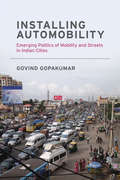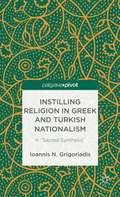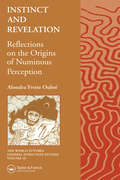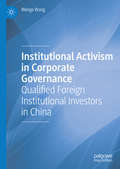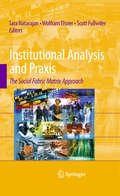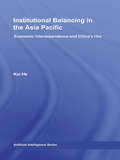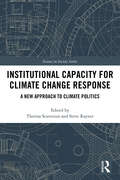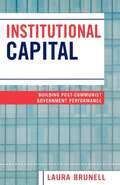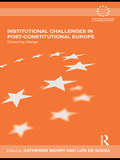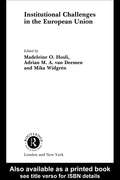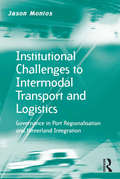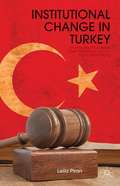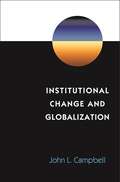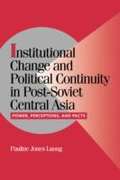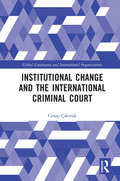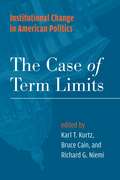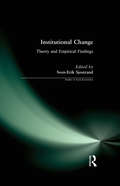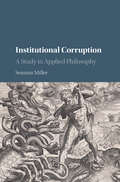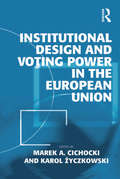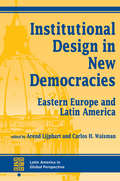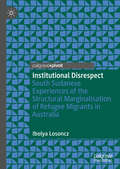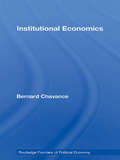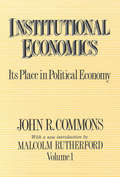- Table View
- List View
Installing Automobility: Emerging Politics of Mobility and Streets in Indian Cities (Urban and Industrial Environments)
by Govind GopakumarAn examination of the process of prioritizing private motorized transportation in Bengaluru, a rapidly growing megacity of the Global South.Automobiles and their associated infrastructures, deeply embedded in Western cities, have become a rapidly growing presence in the mega-cities of the Global South. Streets once crowded with pedestrians, pushcarts, vendors, and bicyclists are now choked with motor vehicles, many of them private automobiles. In this book, Govind Gopakumar examines this shift, analyzing the phenomenon of automobility in Bengaluru (formerly known as Bangalore), a rapidly growing city of about ten million people in southern India. He finds that the advent of automobility in Bengaluru has privileged the mobility needs of the elite while marginalizing those of the rest of the population. Gopakumar connects Bengaluru's burgeoning automobility to the city's history and to the spatial, technological, and social interventions of a variety of urban actors. Automobility becomes a juggernaut, threatening to reorder the city to enhance automotive travel. He discusses the evolution of congestion and urban change in Bengaluru; the “regimes of congestion” that emerge to address the issue; an “infrastructurescape” that shapes the mobile behavior of all residents but is largely governed by the privileged; and the enfranchisement of an “automotive citizenship” (and the disenfranchisement of non-automobile-using publics). Gopakumar also finds that automobility in Bengaluru faces ongoing challenges from such diverse sources as waste flows, popular religiosity, and political leadership. These challenges, however, introduce messiness without upsetting automobility. He therefore calls for efforts to displace automobility that are grounded in reordering the mobility regime, relandscaping the city and its infrastructures, and reclaiming streets for other uses.
Instant City
by Steve InskeepMorning Edition cohost Steve Inskeep presents a riveting account of a single harrowing day in December 2009 that sheds light on the constant tensions in Karachi, Pakistan—when a bomb blast ripped through a Shia religious procession, followed by the torching of hundreds of businesses in Karachi’s commercial district. Through interviews with a broad cross section of Karachi residents, Inskeep peels back the layers of that terrible day. It is the beginning, and a constant touchstone, in a journey across the city’s epic history and its troubled present Thrilling and deeply researched, Instant City tells the story of one of the world’s fastest-growing metropolises and the forces competing to shape its future. .
Instilling Religion in Greek and Turkishn Nationalism: A "Sacred Synthesis"
by Ioannis N. GrigoriadisThe first comparative study to examine the role of religion in the formation of Greek and Turkish nationalisms, this book argues that the shift to an increasingly religious paradigm in both countries can be explained in terms of the exigencies of consolidation and the need to appeal to grassroots elements and account for diversity.
Instinct and Revelation: Reflections on the Origins of Numinous Perception (The\world Futures General Evolution Studies #Vol. 10)
by Alondra OubreInstinct and Revelation revolves around the hypothesis that ritual behavior and imaginative awareness in early hominids may have helped to spawn the evolution of the human brain and human consciousness. Using an integral perspective comparable with systems theory, the book carefully interweaves fact and theory from physical and cultural anthropology, psychobiology and the brain sciences, psychology, and to a lesser degree, eastern philosophy. This book breaks from tradition by discussing from a primarily anthropological perspective the origin of human consciousness within a philosophical framework that embraces precepts from human evolution, evolutionary psychology, the neurosciences, biocultural anthropology, and cultural symbolic anthropology.
Institutional Activism in Corporate Governance: Qualified Foreign Institutional Investors in China
by Wenge WangUsing both qualitative and quantitative methods, this book examines whether qualified foreign institutional investors (QFIIs), through their shareholder activism, have a meaningful positive impact on the corporate governance of firms listed on the mainland Chinese stock market. Capital flows into and out of China are still subject to tight controls, and the QFII scheme is one important avenue through which QFIIs can become invested in the Chinese stock market. This book is an invaluable resource for anyone interested in learning about ways to invest in one of the world’s largest economies. Wang discusses in depth what specific opportunities, challenges and restrictions to expect in the process, and how investing in China differs from investing in countries with a more open capital account.
Institutional Analysis and Praxis
by Wolfram Elsner Scott Fullwiler Tara NatarajanThe Social Fabric Matrix Approach (SFM-A) is a rigorous and holistic methodology for undertaking policy-relevant, complex systems research. This book contains both extensive applications of the SFM-A to contemporary issues and chapters that embed applied research in relevant theoretical, philosophical, and methodological frameworks. It offers a balance of applications through case studies across regions and topics that span areas of finance, development, education, and environment, to name a few. This book creates new ways of using the SFM and forges previously unexplored connections between institutional economics and other areas of study such as financial markets, micro credit, political economy and sustainable development, thus contextually refining the SFM-A. This book complements F. Gregory Hayden's Policymaking for a Good Society: The Social Fabric Matrix Approach to Policy Analysis and Program Evaluation.
Institutional Balancing in the Asia Pacific: Economic interdependence and China's rise (Routledge Contemporary China Series)
by Kai HeThis book examines the strategic interactions among China, the United States, Japan, and Southeast Asian States in the context of China’s rise and globalization after the cold war. Engaging the mainstream theoretical debates in international relations, the author introduces a new theoretical framework—institutional realism—to explain the institutionalization of world politics in the Asia-Pacific after the cold war. Institutional realism suggests that deepening economic interdependence creates a condition under which states are more likely to conduct a new balancing strategy—institutional balancing, i.e., countering pressures or threats through initiating, utilizing, and dominating multilateral institutions—to pursue security under anarchy. To test the validity of institutional realism, Kai He examines the foreign policies of the U.S., Japan, the ASEAN states, and China toward four major multilateral institutions, Asia-Pacific Economic Cooperation (APEC), the Association of Southeast Asian Nations (ASEAN) Regional Forum (ARF), ASEAN Plus Three (APT), and East Asian Summit (EAS). Challenging the popular pessimistic view regarding China’s rise, the book concludes that economic interdependence and structural constraints may well soften the "dragon’s teeth." China’s rise does not mean a dark future for the region. Institutional Balancing in the Asia Pacific will be of great interest to policy makers and scholars of Asian security, international relations, Chinese foreign policy, and U.S. foreign policy.
Institutional Capacity for Climate Change Response: A New Approach to Climate Politics (The Earthscan Science in Society Series)
by Steve Rayner Theresa Birgitta ScaveniusIn a period of rapid climate change and climate governance failures, it is crucial to understand and address how effectively different political institutions can and should react to climate change. <P><P>The term 'institutional response capacity' can be defined as a measurement for how effective political institutions may respond to threats and challenges such as climate change. This book sets out to provide a venue for the discussion of how to conduct climate politics by offering new perspectives on how social and political institutions are capable of responding to climate change. In doing so, the book explores how democracy, institutional design and polycentric governance influence social and political entities’ capacity to mitigate, adapt, address and transform climate change. The book offers building blocks for a new agenda of climate studies by focusing on institutional response capacity and by offering a new approach to climate governance at a time when many political initiatives have failed. <P><P>This interdisciplinary volume is a valuable resource for academics, researchers and policy-makers in the areas of anthropology, political science, geography and environmental studies.
Institutional Capital: Building Post-Communist Government Performance
by Laura BrunellInstitutional Capital was inspired by the coincidence of two events, the end of communism in Central and Eastern Europe and the publication of Robert Putnam's Making Democracy Work: Civic Traditions in Modern Italy (1992). While the author, Laura Brunell, agrees with Putnam's argument that healthy stocks of social capital make democracies work, she argues that building institutional capital is most crucial for post-Communist government performance. Institutional Capital documents and explores the new forms of relationships developing between local governments and organized elements of civil society in post-Communist Poland. <p><p>Using Krakow and Lodz as her cases, Dr. Brunell shows that specific cities are not simply high or low performing regimes. Rather, each city's distinct stock of institutional capital either hampers or enhances its performance in three areas: economic development planning, relocating waste disposal sites, and providing services to victims of domestic violence. The book highlights the importance of civil society in democratization.
Institutional Challenges in Post-Constitutional Europe: Governing Change (Routledge Advances in European Politics #Vol. 54)
by Catherine Moury Luís De SousaThis book discusses the future of the European Union following the failure of the Constitutional and reform treaties, examining the transformations, dynamics and major issues facing present-day Europe. Discussing key questions relating to the future of the European project, this book brings together leading academics and practitioners, including: Adrienne Héritier, Jan Zielonka, Yves Mény, Maurizio Cotta, Philippe Schmitter, ECJ Advocate General Miguel Maduro and former President of the European Parliament, Pat Cox. These contributors provide provocative and innovative accounts of developments within the European Union, contrasting theoretical reflections with a more professional perspective based on first-hand experience in running European affairs. The contributions focus on three key challenges: enlargement, the end of the permissive consensus and the need for democratization of the European Union, considering questions such as: What does Europe represent to neighbouring countries and how is it addressing their expectations? How could a larger Union be governed efficiently? Are European citizens willing to delegate responsibility to their leaders to tackle European integration? Is it accurate to accuse the European Union of a "democratic deficit"? Institutional Challenges in Post-Constitutional Europe will be of interest to students and scholars of European politics, especially those with an interest in European integration/enlargement, constitutionalism, and democratization.
Institutional Challenges in the European Union (Routledge Advances in European Politics #Vol. 6)
by Madeleine O. Hosli Adrian M. A. van Deemen Mika WidgrénThe European Union (EU) is a continuously evolving entity. Starting with six member states in the late 1950s, the EU currently encompasses fifteen states of Western Europe. It is expected to almost double in size in the near future, however, taking in a number of states located in Central and Eastern Europe, in addition to Cyprus and Malta. This dramatic increase has lead to an intensive debate on how the institutions of the EU should be adapted in order to cope with this growth.This book addresses the challenges that EU enlargement and institutional change imply for various policy fields, such as EU trade policy, agriculture and monetary policy in the framework of European economic and monetary union. It will be of interest to economists and political scientists seeking an up-to-date overview of institutional challenges facing the European Union
Institutional Challenges to Intermodal Transport and Logistics: Governance in Port Regionalisation and Hinterland Integration (Transport And Mobility Ser.)
by Jason MoniosWhile the operational realities of intermodal transport are relatively well known, the institutional challenges are less well understood. This book provides an overview of intermodal transport and logistics including the policy background, emerging industry trends and academic approaches. Establishing the three key features of intermodal transport geography as intermodal terminals, inland logistics and hinterland corridors, Jason Monios takes an institutional approach to understanding the difficulties of successful intermodal transport and logistics. Key areas of investigation include the policy and planning background, the roles of public and private stakeholders and the identification of emerging strategy conflicts. Substantial empirical content situates the theoretical and practical issues in real-world examples via three detailed case study chapters (covering the USA, UK and Europe), making the book useful to students as well as practitioners desiring an understanding of how intermodal transport and logistics work in practice. The identified challenges to intermodal transport and logistics are used to demonstrate how competing port and inland strategies can inhibit the necessary processes of integration required to underpin successful intermodal transport. The book concludes with a look at the future of institutional adaptation that may enhance the capacity of freight actors to engage with intermodal transport developments.
Institutional Change In Turkey
by Leila PiranHow do state institutions reform themselves in the face of outside pressures? This study undertakes an in-depth analysis of the institutional and human rights reform process within the Turkish National Police, which faces pressure from the EU as part of Turkey's EU membership process, and examines the challenges and consequences of the process.
Institutional Change and Globalization
by John L. CampbellThis book is about institutional change, how to recognize it, when it occurs, and the mechanisms that cause it to happen. It is the first book to identify problems with the "new institutional analysis," which has emerged as one of the dominant approaches to the study of organizations, economic and political sociology, comparative political economy, politics, and international relations. The book confronts several important problems in institutional analysis, and offers conceptual, methodological, and theoretical tools for resolving them. It argues that the paradigms of institutional analysis--rational choice, organizational, and historical institutionalism--share a set of common analytic problems. Chief among them: failure to define clearly what institutional change is; failure to specify the mechanisms responsible for institutional change; and failure to explain adequately how "ideas" other than self-interests affect institutional change. To demonstrate the utility of his tools for resolving the problems of institutional analysis, Campbell applies them to the phenomenon of globalization. In doing so, he not only corrects serious misunderstandings about globalization, but also develops a new theory of institutional change. This book advances the new institutional analysis by showing how the different paradigms can benefit from constructive dialogue and cross-fertilization.
Institutional Change and Political Continuity in Post-Soviet Central Asia: Power, Perceptions, and Pacts
by Pauline Jones LuongAlthough the three former Soviet Republics of Kazakhstan, Kyrgyzstan, and Uzbekistan shared similar economic and political histories, they developed surprisingly different electoral regimes in the wake of the fall of the Soviet Union. Luong (political science, Yale U. ) seeks to unravel the puzzle of the causes of these institutional developments. She argues that the negotiations over electoral systems lay bare asymmetries of power that can then inform not only the nature of current political change, but also future prospects. She places elite perceptions of shifts in power at the center of her analysis, concluding that none of the political elites saw a fundamental challenge to their power and therefore continued to rely on regionalism as a foundation for their politics. Annotation c. Book News, Inc. , Portland, OR (booknews. com)
Institutional Change and the International Criminal Court (Global Governance and International Organizations)
by Cenap ÇakmakThis book explores the dynamics and trajectories of change in international politics through an English School analysis of primary institutions including international law, sovereignty and diplomacy, with particular reference to the creation of the International Criminal Court (ICC). The study argues that it serves as an important indicator and model for redefining international politics, particularly through its impact upon three major institutions as prescribed by the English School: international law, sovereignty and diplomacy. The author explores three major areas: the ICC’s contribution to the consolidation of the individual as a subject of the international law; the significance of the Court and its jurisdiction in terms of the state sovereignty; and the strong and determinative role of non-state actors active on global level during the diplomatic process upheld for the making of the norms and rules during the creation of the ICC. These three fields of change, point out to the redefinition and reconstruction of international politics, heralding a solidarist vision of international society. The book will be of particular interest to researchers in the field of the IR, as well as graduate students interested in IR theory, international law, and international organizations.
Institutional Change in American Politics
by Karl T. Kurtz Bruce Cain Richard G. NiemiThe 12 chapters presented here by Kurtz (director of the Trust for Representative Democracy at the National Conference of State Legislatures), Cain (political science, U. of California at Berkeley), and Niemi (political science, U. of Rochester) collectively provide a comparative examination of the impact of term limits on state legislatures in the United States, focusing more on effects on the organization and operation of the legislatures than on the effects of turnover on the kinds of individuals elected, although that is discussed in the opening chapters. Other chapters examine leadership selection and tenure; the attitudes of legislators towards their jobs; the decline of the roles of committees in obtaining independent information, serving as a forum for deliberation, and regulating the flow of bills to the legislature; impacts on legislative staff; legislator interrelations; lobbyist influence; legislature-executive relations; and legislator learning and training. Annotation ©2008 Book News, Inc. , Portland, OR (booknews. com)
Institutional Change: Theory and Empirical Findings
by Sven-Erik SjostrandThis book brings together some 15 papers drawn from the 330 papers presented at the Third Annual Conference of the Society for the Advancement of Socio-Economics in Stockholm, Sweden in June 1991. Part 1 outlines a basic theory of institutional change; Parts 2 and 3 examine case studies in international experience with institutional change. The authors of the original papers include Douglas North, Amitai Etzioni, Oliver Williamson, as well as eminent scholars from Eastern and Western Europe, representing views and analyses from ten different countries.
Institutional Choice and Global Commerce
by Walter Mattli Joseph Jupille Walter Mattli Duncan Snidal Joseph JupilleWhy do institutions emerge, operate, evolve and persist? Institutional Choice and Global Commerce elaborates a theory of boundedly rational institutional choice that explains when states USE available institutions, SELECT among alternative forums, CHANGE existing rules, or CREATE new arrangements (USCC). The authors reveal the striking staying power of the institutional status quo and test their innovative theory against evidence on institutional choice in global commerce from the nineteenth through the twenty-first centuries. Cases range from the establishment in 1876 of the first truly international system of commercial dispute resolution, the Mixed Courts of Egypt, to the founding and operation of the General Agreement on Tariffs and Trade, the World Trade Organization, and the International Accounting Standards Board. Analysts of institutional choice henceforth must take seriously not only the distinct demands of specific cooperation dilemmas, but also the wide array of available institutional choices.
Institutional Corruption: A Study in Applied Philosophy
by Miller SeumasIn this book, Seumas Miller develops distinctive philosophical analyses of corruption, collective responsibility and integrity systems, and applies them to cases in both the public and the private sectors. Using numerous well-known examples of institutional corruption, he explores a variety of actual and potential anti-corruption measures. The result is a wide-ranging, theoretically sophisticated and empirically informed work on institutional corruption and how to combat it. Part I defines the key concepts of corruption, power, collective responsibility, bribery, abuse of authority and nepotism; Part II discusses anti-corruption and integrity systems, corruption investigations and whistle-blowing; and Part III focuses on corruption and anti-corruption in specific institutional settings, namely policing, finance, business and government. Integrating theory with practical approaches, this book will be important for those interested in the philosophy and ethics of corruption as well as for those who work to combat it.
Institutional Design and Voting Power in the European Union
by Karol ZyczkowskiLeading global experts in the field of politics and mathematics bring forth key insights on how voting power should be allocated between EU member states, and what the policy consequences are of any given institutional design. Close attention is paid to the practical implications of decision-making rules, the nature and distribution of power, and the most equitable ways to represent the preoccupations of European citizens both in the Council and European Parliament. Highly theoretical and methodologically advanced, this volume is set to enrich the debate on the future of the EU's institutional design. A valuable source of information to scholars of political science, European studies and law, as well as to people working on game theory, theory of voting and, in general, applications of mathematics to social science.
Institutional Design in New Democracies: Eastern Europe and Latin America (Latin America in Global Perspective)
by Arend Lijphart<p>Countries throughout Latin America and Central and Eastern Europe are moving from semi-closed to open economies and from authoritarian to democratic political systems. Despite important differences between the regions, these transitions involve similar tasks: the establishment of governmental institutions and electoral systems conducive to legitimation of the new and fragile democracies and expansion of the institutional infrastructure of a market economy. <p>This volume looks at both regions, focusing on the relationship between the tasks of institutional design and the outcomes of the process of economic and political liberalization. In particular, the contributors emphasize the design of institutions to serve a market economy, the design of electoral laws, and the design of executive-legislative relations. Each chapter discusses the legacy of the pre-existing authoritarian regime; the range of preferences among various strategic actors (the government, state bureaucracies, opposition parties, and interest groups) with regard to the pace and mix of reforms; and the consequences of final choices for the institutionalization of effective economies and the process of democratization.</p>
Institutional Disrespect: South Sudanese Experiences of the Structural Marginalisation of Refugee Migrants in Australia
by Ibolya LosonczThis book is about the institutional disrespect experienced by refugee immigrants at the hands of the state and its institutions. The desire to be treated respectfully is not felt only by refugees, but they are a much higher risk of not receiving it. Using a case study of recently settled South Sudanese Australians, the author uncovers the social realities of their marginalisation and examines how blocked pathways to cultivate collective and self-identities can lead to a breakdown of social bonds between immigrants and social institutions. Institutional Disrespect invites us to take a fresh look at whose responsibility it is to address the disrespect felt by immigrants and other marginalised groups, and argues that when disrespect is systemic in governance arrangements, or comes in the forms of injustice and institutional mistreatment, the responsibility lies not with individuals but with the state, its institutions and its appointed bureaucrats.
Institutional Economics (Routledge Frontiers of Political Economy)
by Bernard ChavanceThis introduction to institutional economics, follows the history of the field since the early 20th century until the present day. It concentrates on influential authors in the main schools of institutional economics. Institutional economics is defined as economic thought that considers institutions to be relevant for economic theory, and consequently criticizes the neoclassical mainstream for having pushed them out of the discipline; it deals specially with the nature, the origin, the change of institutions, and their effects on economic performance. It is a family of different theories that were initially influential in economics, then lost much of their weight in the middle half of the 20th century, and eventually recovered significant creative vitality and impact in the last twenty years. The book puts the recent developments in historical perspective by showing how important themes like the importance of habits, the role of formal and informal rules, the relation of organizations and institutions, the hierarchy and complementarity of institutions, the evolutionary character of institutional change, have been explored by various authors or schools.
Institutional Economics: Its Place in Political Economy, Volume 1
by John R. CommonsCommons opened Institutional Economics by declaring: ""My point of view is based on my participation in collective activities, from which I here derive a theory of the part played by collective action in control of individual action."" This sentence well summarizes the three key elements of this book--its theoretical intent, the importance Commons gave to his own experience in institutional reform in shaping these ideas, and the focus on the concept of the institution as a collective constraint on individual action.
